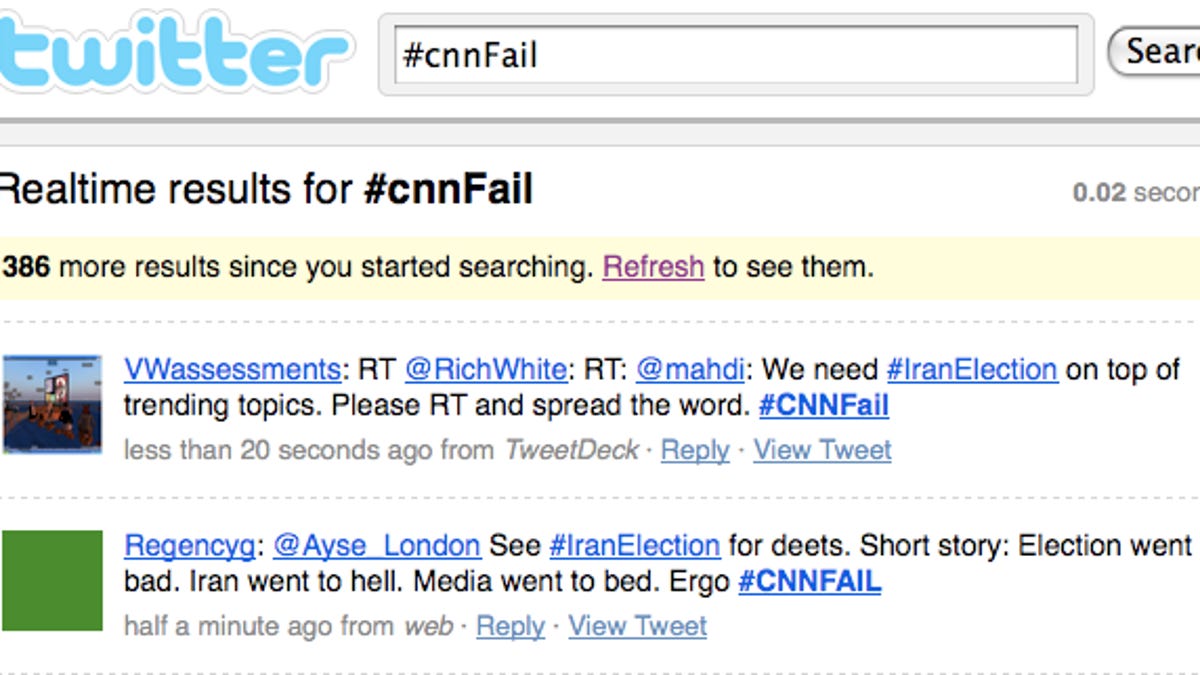'#CNNFail': Twitterverse slams network's Iran absence
The network that became famous by having reporters on the ground as bombs fell on Baghdad in 1991 missed the boat on the Iranian riots, and Twitter users noticed.

As the Iranian election aftermath unfolded in Tehran--thousands of demonstrators took to the streets to express their anger at perceived electoral irregularities--an unexpected hashtag began to explode through the Twitterverse: "CNNFail."
Even as Twitter became the best source for rapid-fire news developments from the front lines of the riots in Tehran, a growing number of users of the microblogging service were incredulous at the near total lack of coverage of the story on CNN, a network that cut its teeth with on-the-spot reporting from the Middle East.
For most of Saturday, CNN.com had no stories about the massive protests on behalf of Mir Hossein Mousavi, who was reported by the Iranian government to have lost to the sitting president, Mahmoud Ahmadinejad. The widespread street clashes--nearly unheard of in the tightly controlled Iran--reflected popular belief that the election had been rigged, a sentiment that was even echoed, to some extent, by the U.S. government Saturday.
"The Obama administration is determined to press on with efforts to engage the Iranian government," The New York Times cited senior officials as having said Saturday, "despite misgivings about irregularities in the re-election of President Mahmoud Ahmadinejad."
Yet even as word of the urban strife, seemingly led by those posting to Twitter, spread next around the world on news networks like the BBC, NPR, and the Times, CNN remained mostly mute. Even when the network's Internet site finally posted a story late Saturday, the network's first "story highlight" was, "Ahmadinejad plans rally after winning second presidential term."
Increasingly, Twitter has become the go-to source for breaking news about any kind of notable event, be it an earthquake, terrorist attacks in Mumbai, or post-election riots in Tehran. Yet many Twitter users found CNN's lack of attention to what could end up being one of the biggest stories in years appalling.
"CNN just loops the same stories endlessly, while ignoring the biggest story," posted Twitter user MediaButcher.
"CNN needs to talk about the important things like Ms. California and who Paris Hilton is (sleeping with)," wrote Twitter user ArchivalQuality.
Others used the opportunity to applaud the work of other networks while indirectly criticizing CNN. "Might I point out to all of those tracking #CNNFail that there's a corresponding #NPRWin good coverage @ www.npr.org," opined Twitter user Nickbernstein, referring to the Twitter convention of using "hashtags," or pound-signs before keywords to indicate Twitter search terms, in this case a reference to the suggestion that NPR had done a good job covering the Iranian riots.
And it wasn't long before word of CNN's theoretical reporting failure began to make its way into more established media. Under the headline, "Dear CNN, Please Check Twitter for News About Iran," the popular blog ReadWriteWeb blasted the network for its failure to cover the clearly massive story in the Middle East.
"Hours after Iranian police began clashing with tens of thousands of people in the street," ReadWriteWeb wrote late Saturday night, "the top story on CNN.com remains peoples' confusion about the switch from analog TV signals."
It's odd that CNN would be so late to this story, especially given the criticism it's getting from the Twitterverse, and given how clued in the network is supposed to be to Twitter. It was, after all, only two months ago that CNN's Twitter account barely missed out--to actor Ashton Kutcher--on being the first to accumulate a million followers.
One would think, then, that when the idea began to percolate around Twitter that CNN was missing out on a major, historical story like the one developing in Iran, the network would have noted the discontent and done something about it.
But even as the sun prepared to rise in the eastern United States, CNN's Web site was still focusing on Ahmadinejad's victory and not the fact that massive riots in the streets of Tehran might be a world-changing moment, potentially on par with the failed 1991 coup in the Soviet Union that led to the collapse of the authoritarian government there.
To be sure, it's too early to tell if the events unfolding in Terhan will have such a lasting effect. But in Iran, there haven't been such vivid pictures of popular anger at the government since the revolution there in 1979 that toppled the Shah and led to the current religious fundamentalist leadership.
And to the thousands on Twitter posting to the #CNNFail thread, this story should be a no-brainer for the network that managed to have the only reporters on the ground when the United States began bombing Baghdad in 1991 at the beginning of the Gulf War.

